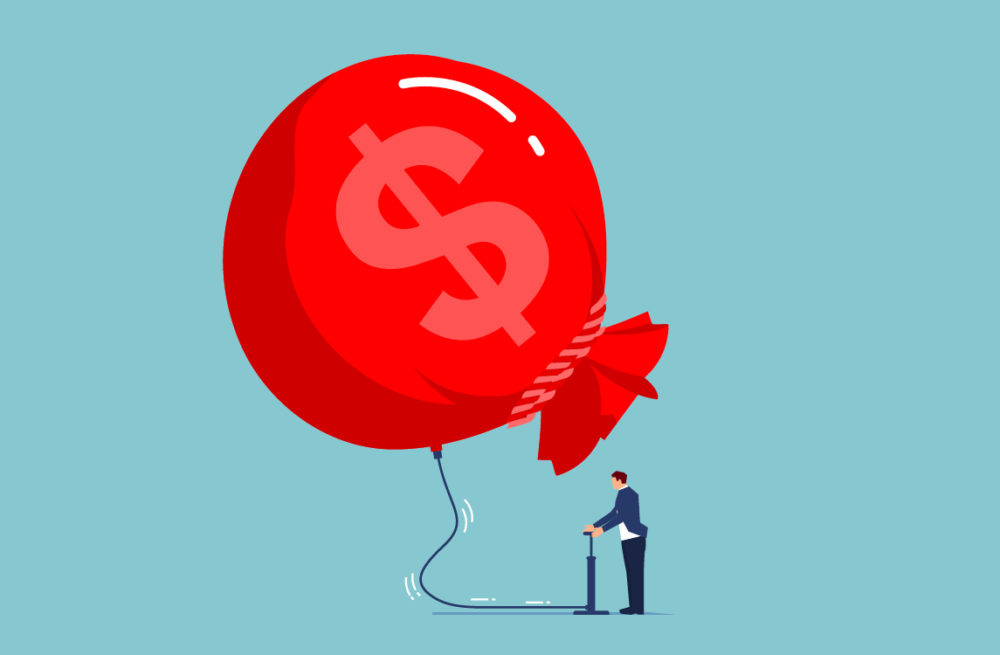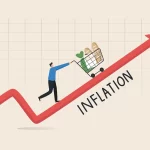By now all of us have experienced the historic inflation that’s been part of our lives over the past year. From food to gasoline to housing and cars, no one has been exempt from the inconvenience of higher prices. And with the report this morning (2/10/22) that inflation has surged 7.5% on an annual basis (CNBC.com), the realization that inflation hasn’t seen this level of gain since February 1982 makes it even more of an eye-opener. Many or you reading this weren’t even born then, so this may be all-new territory for you. Your humble author however, has seen this movie before.
Inconvenient. If that’s all it was (or is going to be), it might be a bit better tolerated. With the economy still moving along in swift fashion, the additional costs, while irritating, haven’t been too painful, at least not yet. None of us are happy about paying significantly more for the same product (or service) as we did just one year ago, especially when that additional amount could be used to pay for something we truly DO want to spend our money on. But as long as income gains continue to be made (rising wages), the pain should be able to be managed. Until it can’t be managed anymore. Those at the lower end of the economic ladder feel inflation the most, since those living paycheck-to-paycheck spend the highest percentage of income on housing and transportation. With the increases in cost of food and fuel, choices have to be made which, in many cases, result in food insecurity.
Supply chain stresses have been a leading reason why prices have risen so dramatically and many know this via the news. The fact that past stimulus cash finding its way into the economy in conjunction with steady, if not increasing incomes (due to low unemployment) with manufacturers simultaneously still struggling to produce to meet demand is a big reason prices continue to climb. And with the bottlenecks not appearing to be resolved anytime in the near term (not enough workers, but that’s another post), it appears higher prices are going to be with us for a while, especially if spending continues to remain steady.
So then, what can or should be done to rectify ever-higher prices? As stated in my last post, Fed Chair Jerome Powell has already instituted a program of slowing down Treasury and mortgage-backed securities purchases, presumably until buying reaches zero. Since there is an inverse relationship between price and yield on bonds (ie; when bond prices rise with demand, yield falls; bond prices fall when demand slows, so yields rise), this strategy alone should result in higher interest rates. However, with today’s news on inflation, the Fed may be set to also increase interest rates (the Fed funds rate) more aggressively than was earlier expected. Doing so could throw cold water on the economy by making the cost of borrowing more expensive, from homes to cars and credit cards. This is a game of delicate balance for the Fed, since not raising rates high enough could lead to an even more overheated economy, where inflation becomes red-hot and prices get out of control. Conversely, if the Fed raises rates too high or too fast, the economy comes to a screeching halt, leading to a recession. How long or deep is unknown, but recessions always lead to job losses, high unemployment and a contracting equity market, all of which leads to economic anxiety.
The additional wildcard which, at present, no one is yet talking about, is the $30 Trillion of National Debt that can (and will) be affected by any interest rate hikes (usdebtclock.org). Interest rate hikes mean that, as the national debt matures, it rolls over to the higher rates. This means that Uncle Sam would be forced to pay more interest to those purchasing that debt, leading to higher interest costs. The result would mean that either taxes would have to be raised to offset the higher costs, more economic activity would need to be generated to raise the additional funds needed or government services would need to be curtailed. A balancing act, indeed.
At this point you may be asking what inflation comments have to do with insurance. As I stated in past posts, with interest rates still at historically low levels, now is the time to put a plan in place to get debt paid off, especially revolving debt. And although the Fed will undoubtedly raise rates in the near future, bear in mind that they won’t be able to raise them too quickly or too high for fear of incurring a recession, as well as the aforementioned federal borrowing costs. All of which means there should be time get out of debt as long as a thorough plan is in place. And yes, with economic uncertainty lying ahead, it makes sense to pay off fixed rate debt as well, such as auto loans and mortgages. The Your Family Bank debt payoff concept addresses all types of debt.
Additionally, with the stock market at all-time highs, those who are approximately ten years or closer to retirement may want to consider peeling off some gains and put that cash to work in a vehicle which guarantees lifetime income with benefits to help pay for expenses incurred due to loss of ADL’s (activities of daily living). Both of these issues can be addressed with insurance products. Doing so will allow peace of mind as we navigate an issue (inflation) which hasn’t been this relevant in over forty years.
I once again thank you for reading and hope I’ve brought value to your time. If you’d like to learn more about what I’ve discussed here or just wish to comment, please contact me at d.babecki@db3insuranceservices.com or give me a call at 941-704-3134. As always, thank you for reading and let me know how I can be of service.
About David J Babecki
David Babecki is the Owner/Founder of DB3 Insurance Services and has over 20 years of experience in personal insurance, proudly protecting clients against outliving their money, stock market risk, and of course, insuring their lives against the unforeseen.
David started his career with Raymond James & Associates in 2000 before becoming an independent agent where he offers a number of services to solve client needs. David has spent the majority of his life in the beautiful Tampa Bay area where he currently resides with his family.
David is a Licensed Life Insurance Agent FL # D053146
The above article reflects the opinions and thoughts of David J. Babecki. The information contained in this material is believed to be reliable, but not guaranteed. It is for informational purposes only and is not a solicitation to buy or sell any products which may be mentioned. It is not intended to be used as the sole basis for financial decisions, nor should it be construed as advice designed to meet the particular needs of an individual’s situation.
Please note: All guarantees and/or promises are based on the claims-paying ability of the respective insurance company.









































